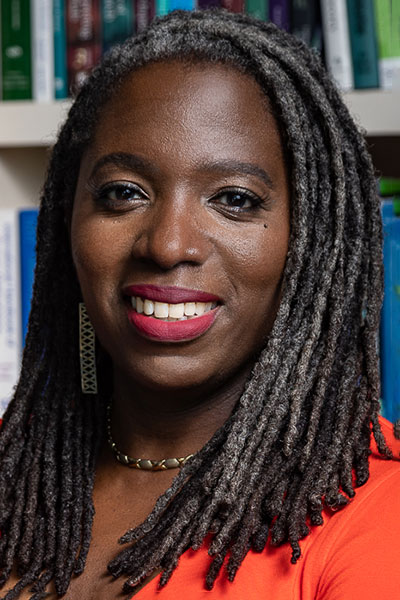
According to the Physician’s Pledge, members of the medical profession must serve humanity without considering ethnicity. But in a health system built on a culture of racism, that can’t happen unless physicians initiate change.
In an honor lecture at CHEST 2022, Our Past, Our Present, Our Future: Addressing Racism in Medicine, on Tuesday, October 18, Nneka Sederstrom, PhD, MPH, MA, FCCP, urged her colleagues to broaden their awareness, build empathy, and dismantle racist structures so they can treat their patients without inflicting further trauma.
“Continuously working in systems and structures that are racist without actively doing things to change that perpetuates and maintains racism,” she said. “So, we all, every day, have to do something different than what we normally do.”
Dr. Sederstrom, chief health equity officer at Hennepin Healthcare System, was selected to give the Richard S. Irwin, MD, Master FCCP, Honor Lecture for her dedication to advancing patient-focused care, mirroring the efforts of Dr. Irwin, who has promoted shared decision-making during his 50-plus-year career in pulmonary and critical care medicine. As a medical ethicist and health equity specialist, Dr. Sederstrom has spent her career working to correct inequities in care related to gender, ethnicity, and race.
How did we get here?
Dr. Sederstrom explained how racism became intertwined with health care in the United States.
The first enslaved Africans arrived in 1619, she said, after which, Black people in America were born into the torture of slavery for hundreds of years. Freed after the ratification of the 13th Amendment in 1865, former slaves turned to a federal Freedmen’s Bureau for their basic needs. However, the bureau’s capabilities were limited due to a lack of staff and funding, coupled with opposition from leaders including President Andrew Johnson. During the next five decades, a time of systemic and violent segregation known as the Great Nadir, Black Americans found that their freedom was conditional.
After previously having no access to health care as slaves, Black people in America were then relegated to separate, underfunded hospitals, and so, eventually, took charge of their own care, Dr. Sederstrom said. In 1883, Dr. Rebecca Lee Crumpler, the first Black woman to graduate from the New England Female Medical College, published “A Book of Medical Discourses: In Two Parts” to teach Black women to take care of their families. And despite opposition from many, Black medical schools and doctors multiplied.
“This was the beginning of when Black people were told that the only way to care for yourself is to find a Black clinician, and we know how that has trickled into communities nowadays,” Dr. Sederstrom said. “If we have Black patients seeing Black clinicians, they have a 30% better chance of outcomes, specifically because of racial concordance.”
Health disparities persist
Medical practice was finally desegregated in 1965, when Medicare was established and physicians and hospitals were incentivized to care for older people regardless of their ethnicity.
Although Medicare helped equalize care, “disparities persist by gender, geography, race, ethnicity, and other factors, all of them driven by social, economic, and environmental conditions,” Dr. Sederstrom said. In addition to systemic racism and the lack of trust it engenders, she said, a key reason is the trauma Black people have endured.
A history of continuous trauma causes a biological reaction in bodies, altering DNA and affecting future generations, Dr. Sederstrom said, and there has not been a break in that trend since slavery.
“Our work lies in realizing that and doing something about it,” she said.
Contributing to change
Today, she said, “more people are having the strength and the courage to step up and say, ‘Hey, no more.’” To initiate change, Dr. Sederstrom recommends that physicians:
- Learn their history. Important books clinicians can read to better understand the historical context affecting health care disparities today include “Medical Apartheid: The Dark History of Medical Experimentation on Black Americans from Colonial Times to the Present,” by Harriet A. Washington, and “The Sum of Us: What Racism Costs Everyone and How We Can Prosper Together,” by Heather McGhee.
- Acknowledge racism in health care. Believe patients who say they’ve been treated differently because of their race, and make decisions accordingly.
- Improve care options for Black patients by increasing practitioner diversity and training clinicians not to normalize only White bodies.
- Change their spheres of influence to include diverse individuals, breeding empathy that will result in better patient communication, compliance, and satisfaction.
“Even if it’s hard, it just requires one step. You may fail, but at least you’re failing forward,” Dr. Sederstrom said. “Then you take a next step, because enough is enough.”
Join us at CHEST 2025
Save the date for the next Annual Meeting, October 19 to 22, 2025, in Chicago. CHEST 2025 will explore the latest advancements in pulmonary, critical care, and sleep medicine, with a focus on innovation and the future, just as the city itself embodies progress and reinvention.





